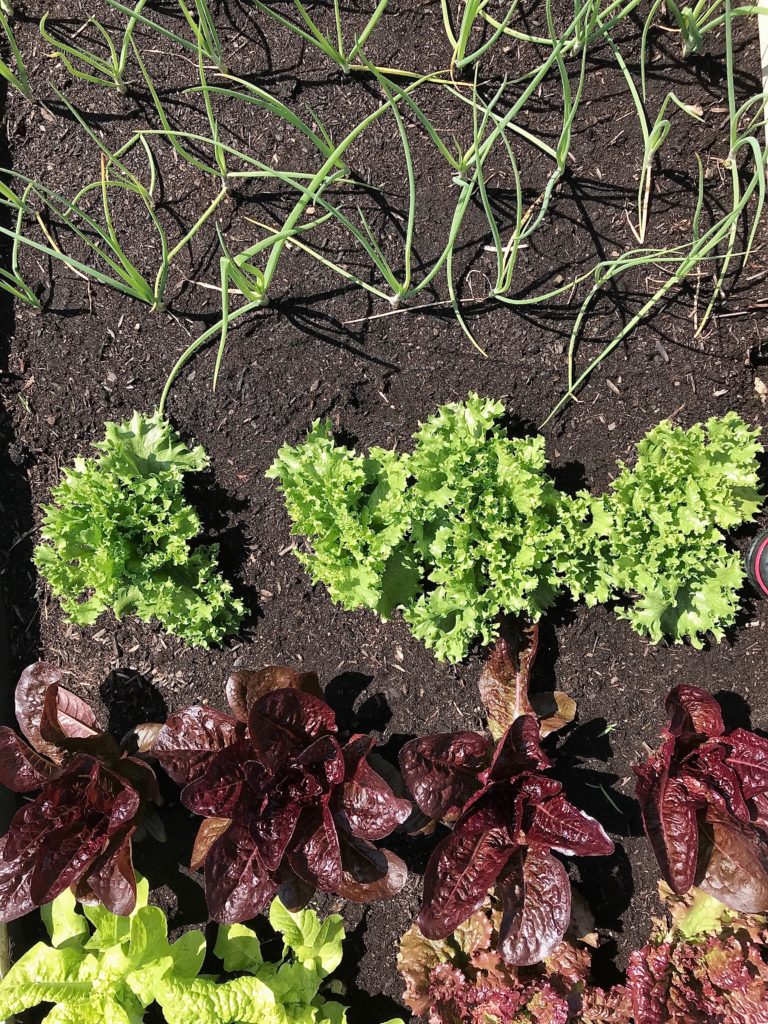
I was a gardener that planted my vegetables in long, straight rows by plant type. Even though my garden was productive, I still had varieties that struggled and provided very little to nothing. With experience, my gardening habits have changed. I now focus on plant rotation, close planting, and plant combinations that are beneficial to each other. Maybe you’re new to gardening or would like to increase production or reduce combative insects, and if so, I recommend giving companion planting a try.
From container gardening to raise beds, companion planting is beneficial for all garden sizes and layouts. This is a simple technique that will help repel unwanted insects, encourage beneficial pollinators to visit, improve soil health, and make your vegetable garden flourish. And, it’s simple. Adding marigolds around your potatoes will help repel beetles while bush beans will thrive between your potato rows. A sizeable potted tomato plant benefits when basil is next to it. A quick Internet search for companion planting by specific vegetable type will yield results and combinations far more than you can imagine.
The following list highlights common vegetables with compatible and combative plant recommendations. This is not an all-inclusive list but provides basic information on potential combinations to get started.
- BEANS / Compatible = Carrots, celery, peas, petunias, potatoes, radishes, strawberries, and tomatoes.
- BEANS / Combative = Fennel, garlic, leeks, onions, peppers, and sunflowers.
- BEETS / Compatible = Asparagus, bush beans, lettuce and onions.
- BEETS / Combative = Pole beans, strawberries and tomatoes.
- CARROTS / Compatible = Beans, leeks, lettuce, onions, peas, peppers, radishes, rosemary, sage, tomatoes and marigolds.
- CARROTS / Combative = Dill and parsley.
- CUCUMBERS / Compatible = Beans, cabbage, lettuce, peas, radishes, and sunflowers.
- CUCUMBERS / Combative = Herbs, melons, and potatoes.
- LETTUCE / Compatible = Asparagus, beets, carrots, cucumbers, onions, peas, radishes, spinach, strawberries, sunflowers and tomatoes.
- LETTUCE / Combative = Broccoli, cauliflower, and cabbage.
- PEAS / Compatible = Bush beans, carrots, cucumbers, lettuce, melons, potatoes, radishes, spinach, and turnips.
- PEAS / Combative = Garlic, leeks and onions.
- PEPPERS / Compatible = Basil, carrots, lettuce, marigolds, onions, radishes, spinach, and tomatoes.
- PEPPERS / Combative = Fennel
- POTATOES / Compatible = Beans, cabbage, garlic, kale, lettuce, marigolds, onions, peas, and radishes.
- POTATOES / Combative = Cucumbers, melons, squash, zucchini, sunflowers, and tomatoes.
- RADISHES / Compatible = Cucumbers, lettuce, marigolds, nasturtiums, onions, peas, and pole beans.
- SPINACH / Compatible = Asparagus, celery, dill, lettuce, onions, peas, peppers, radishes, strawberries, and tomatoes.
- STRAWBERRIES / Compatible = Bush beans, lettuce, spinach, onions, and marigolds.
- STRAWBERRIES / Combative = Broccoli, cabbage and cauliflower.
- TOMATOES / Compatible = Asparagus, basil, beans, carrots, celery, chives, dill, garlic, lettuce, nasturtiums, onions, parsley, radishes, spinach, and thyme.
- TOMATOES / Combative = Broccoli, cabbage, cauliflower, corn, dill, fennel, and potatoes.
- ZUCCHINI & SUMMER SQUASH / Compatible = Beans, dill, garlic, oregano, nasturtiums, parsley, spinach, radish, peas, and beans.
- ZUCCHINI & SUMMER SQUASH / Combative = Potatoes and pumpkins.